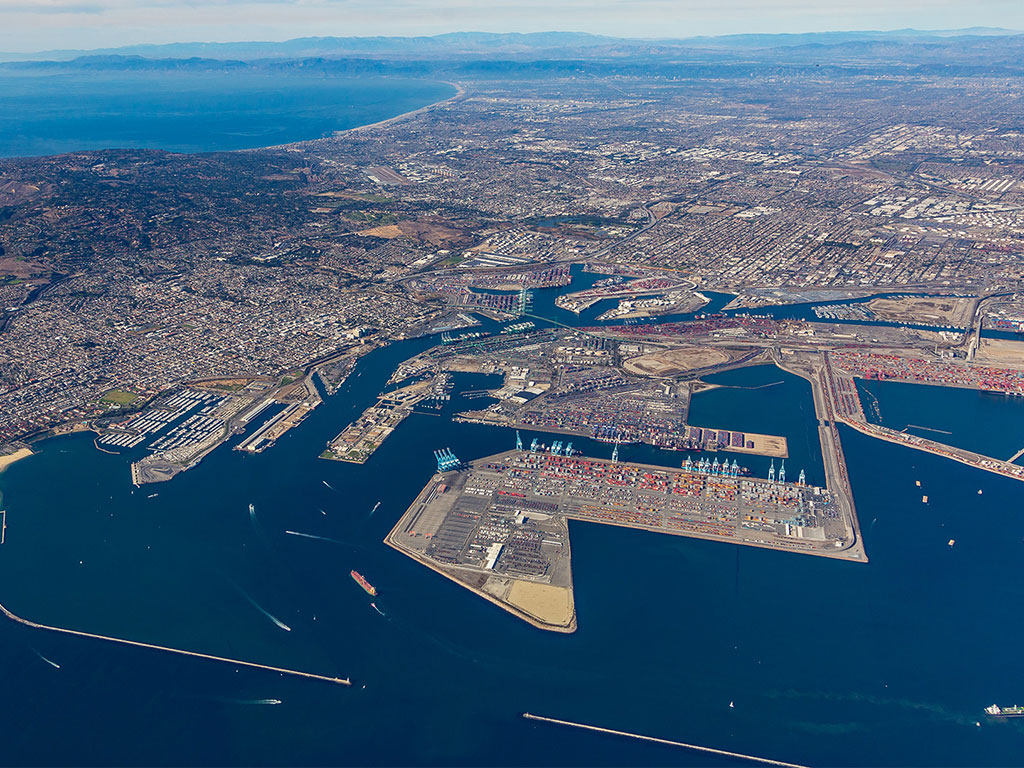Port of Los Angeles Executive Director Gene Seroka supports U.S. agricultural exporter efforts to increase export bookings on global ocean carriers, but cites challenges related to the recent import volume surge.
Seroka was speaking at the Port of Los Angeles September 15th media briefing, where he said:
He noted that because many agricultural exporters are located in rural areas there is a distance problem moving an import container destined for a metropolitan area out to a rural area: “Our shipping and services industries really work on round-trip economics to bring imports in and circle those exports back to Asia… Again, that trade gap allows us to capture a certain amount of empty containers to reposition, but triangulating these economics is the biggest challenge.”

The triangulation challenge has become more costly and time consuming during the current import surge facing the Port of Los Angeles and other U.S. ports:
“Trying to find a way to get an empty container chassis and truck power from the Chicago area up to the Red River Valley of North Dakota to load up with soybeans or Number Five Red Wheat has been an elusive solution to all of us. The repositioning costs are extraordinarily high and only exacerbated with this import buying surge that we have witnessed. Unfortunately, the trade policy has carried over from the last Administration. “
Seroka was referring to tariffs placed on Chinese imports by the Trump Administration that resulted in China placing tariffs on U.S. exports headed for China.
The Port of Los Angeles has worked to develop new ideas to address challenges faced by U.S. exporters and cited one idea developed with AgTC’s Peter Friedmann:
“We’re talking across stakeholder groups and trying to get big thinkers at the table to talk about how we can do this.
Peter Friedmann recommended that we work on near-port locations of agricultural supply to where we can turn these empty containers (at a distance of 12 or 24 hours) and get them back to the Port for the first acceptance day possible and load to an export vessel.
So, there are creative ideas coming from the membership as well as leadership of the agricultural sector that we want to take a swing at and employ, whether it be on a trial or pilot basis to test the concept.”
The Port’s digital information service helps exporters plan: “And again, having that information early and sharing it across stakeholder groups can only help us be more intuitive and execute on these platforms better than we’ve done. This is one of the most important pieces of work that we face today.”
Seroka advocates, “A national export strategy that I have called for, not legislation or regulation but how do we bring people back into the export market? Are there ways we can create hiring and training opportunities using incentives to get service providers to carry more export cargo where it makes sense. In addition, workforce training is paramount.”

U.S. Ag Exporters Seek Biden Administration Help
On September 13th, the Agriculture Transportation Coalition and other agricultural exporters sent a letter to President Biden expressing concerns about the ability of agricultural exporters to obtain export cargo bookings with global container shipping carriers, who, the exporters believe, are emphasizing imports over exports:
“Carriers are increasingly declining or cancelling export cargo bookings, while frequent ship delays and cancellations with little or no notice to our exporters, is delaying shipments by weeks or even months. The resulting inability of shippers to deliver their products on schedule affects the reliability of American exports, and subsequently decreases export values and market share.
The cost to ship a container has increased between 300% and 500% in the past 2 years; U.S. producers are losing from 10%-40 % of their export value to these added costs; an informal survey suggests that U.S. agriculture exporters’ inability to perform is leading to a loss of 22% of their sales.
We realize that the challenges our agriculture exporters face will not change overnight. But with the holiday import surges soon upon us, the challenge is growing. Regulatory action and enforcement steps take time to be implemented, and while those important processes need to move ahead, we call on you and your administration to take effective steps to gain immediate relief. Recognizing that relief may be incremental, it must begin very soon. “
The letter notes that the “White House Supply Chain Task Force has been meeting with food and agriculture industry stakeholders to identify near-term solutions to supply chain problems.”
To that end, the U.S. exporters say: “there are several steps the Administration can take,” including:
- Support legislation, including the bipartisan Ocean Shipping Reform Act, HR 4996, to address the unfair practices that are currently damaging U.S. agriculture exports
- Direct the Department of Justice to review the existing Shipping Act law to determine if the enforcement tools in that Act can be activated to gain compliance with the other provisions of the Act setting forth reasonable practices
- Establish an inter-agency working group focused on facilitating agriculture exports
- Sponsor initiatives to increase operational tempo, including increasing gate operations, to include port authorities, terminal operators, labor, ocean carriers, shippers, truckers
- Provide Federal support for deployment of port and national data-sharing portals, such as already developed by the Port of Los Angeles
- Incentivize ocean carriers to increase export flows, by fully utilizing their existing capacity
- Increase coordination between the FMC (Federal Maritime Commission) and the Surface Transportation Board on oversight of multi-modal container shipments to assure that the FMC and the Shipping Act apply to the complete international transit of goods from origin to destination
- Provide public support for and any necessary resources towards the activities the FMC is undertaking on this issue, including the Interpretive Rule on Demurrage and Detention and other enforcement and administrative actions.

